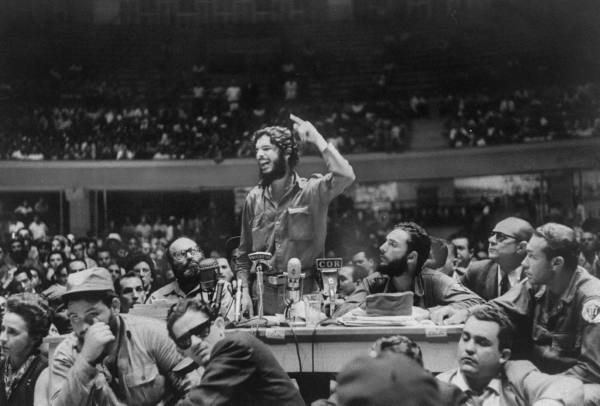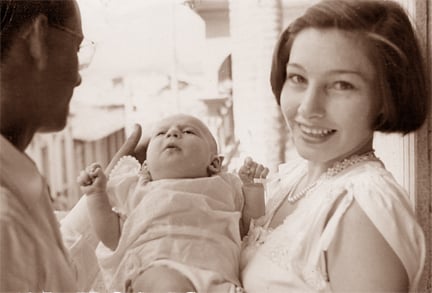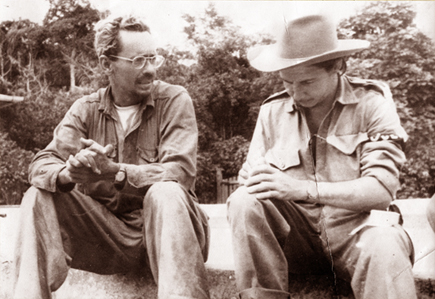Che Guevara: we have seen movies about Che, heard about "El Che", and curiosity to know how Che is interpreted by different people of the world. we always want to know if he is a hero or just an arrogant guy.
why people love him in Cuba ?
When the media is against him ?
How is this guy so popular?
Why are college students so obsessed with Che Guevara?
I have found a true story on internet about Che Guevara.
This story is written by mr. Leonardo Moran. he also wrote a E-Book "Cuba: A Leap of Faith"
Here is Leonardo Moran personal family story dealing with Mr. Che Guevara:
When I was 2 years old the Cuban Revolution was in full swing. My father was the sort of lawyer people in trouble wanted. One who never billed clients and rarely walked away from a fight. In a landmark case that stunned the nation, 84 members of an armed invasion led by Fidel Castro were put on trial for seeking to topple Cuba’s dictator. The event is referred to in Cuban history as the Granma invasion. Papa took the case pro bono.
Lucas and Dora Morán, Santiago de Cuba, 1955 Image Source
As attorney for the defense, father admitted their guilt. And proclaimed their innocence. “Cuba’s Constitution,” he told the tribunal, “makes it every citizen’s duty to oppose tyranny, precisely as they have done. Release them. It's not they but Batista who's here on trial!” A forceful defense. So much so, the prosecutor walked the length of the court to stand beside him, declaring unwillingness to seek punishment. The lead magistrate voiced the same opinion; he voted to acquit. You can imagine the tumult in that place. The two remaining justices, cowed and fearful, voted to convict. Our trial of the century.
When I was 3 dad went into hiding. He didn’t have much choice. The police were after him. Cuba’s dictator didn’t like those courtroom antics. He ordered dad’s assassination. (It was commonplace then.) Dad fled the city, joining Fidel Castro’s rebel army in the Sierra Maestra. Fidel gave him a rifle and commissioned him captain. Every once in a while, he’d come down from the mountains to see us kids. He’d dye his hair blonde, or wear a dark moustache. Always incognito. Because by the time I was 4, papa had analyzed Fidel. He didn't like what he saw: an intelligent, deceitful psychopath of totalitarian pretensions.
Captain Lucas Morán (l.) and Comandante Raúl Castro (r.), in the mountains of the Sierra Cristal, summer of 1958 Image Source
At that point in the war, Fidel had opened a second front in the mountains of the Sierra Cristal. He put in command his younger brother Raúl, a cruel, despotic little man with distinct Napoleonic tendencies. (Fidel once warned the rebels: “You’d better hope no bullet gets me. Because if it does, you’re going to have him.”)
Things were looking up for the revolution. Government soldiers were surrendering in droves, and one day Comandante Raúl found himself with two hundred captives, no place to jail them, and no guards to watch them. He and Che Guevara together informed Captain Morán they were to be shot. Father was enraged. ‘A criminal and cowardly act,' he called it. The murder of unarmed men. “The only legal course,” papa told Raúl, “Is their release. They can be paroled to the Catholic church or the Red Cross.” A complicated solution, and not without risk, but it was so done.
Papa then launched a revolution within and against the Revolution. He composed a legal writ. Rebel officers penned their names alongside his. (Raúl was not popular among them, having a sadistic and unsavory reputation.) Papa’s writ is referred to in Cuban history as la ley de los capitanes–‘the captains’ law’. Sort of like a little Cuban Magna Carta, it was our first attempt to curb Castro’s tyranny.
A council of officers will henceforth examine all orders decreed by Comandante Castro. We will veto illegal or immoral commands. Extrajudicial punishment and trial by firing squad will end. Defendants will be given opportunity to present evidence and call witnesses…
Cuba’s rural peasantry was then mired in poverty and illiteracy, a situation best described as feudalism. As the rebels freed vast tracts of the Sierra, land grants were made to sharecroppers in territorio libre de Cuba. A rural literacy campaign brought teacher-volunteers from the cities to teach mountain dwellers their abecedario. Papa saw literacy as a powerful tool against oppression. But he also knew liberation would be short lived, should Castro assume dictatorial powers. “He wants to herd us out of one pen,” he warned fellow officers, “and cage us in another.”
Castro’s answer to ‘the captains’ law’? Capt. Morán was summoned before Raúl and Che Guevara for ‘a frank exchange of ideas’. It proved nothing of the sort. He was arrested. This is war, Che reminded. And in a war, he said, we may send men to the firing squad as we see fit. Evidence is academic. Legal procedures are archaic bourgeois details. The Revolution must have absolute power to coerce and to punish. Raúl accused papa of conspiring against Fidel. ‘This is treason,’ he accused; ‘Treachery, sedition, subversion, betrayal!’ Crimes against the Revolution.
A trial was held in the mountains of the Sierra. He was court-martialed. Were it not for his role in the urban resistance, and his following among rebel ranks, he’d have been shot. Instead he was disarmed and sent back to the city. In disgrace, (so they said), there to face Batista’s wrath. Raúl’s operatives then tipped off the dictator’s police. 'A fugitive from justice, the lawyer Lucas Moran, is in central Havana.' Pursued in the mountains as well as the cities, papa faced more than one of Batista's assassins, evading several attempts on his life.
When I turned 5 Fidel won the Revolution. I remember the victory parades, army tanks in the street. At the School of Law where he once taught, papa was tried in absentia. Chief witness for the prosecution was one of his former law students. The young man had served alongside papa in Castro's Army of Liberation. His name was Jorge Serguera. Dad’s little Magna Carta, and his refusal to take part in revolutionary trials (with death by firing squad) were judged ‘counter-revolutionary acts.’ Penalty was death by firing squad.
But papa had made many friends during the revolution. He’d won many courtroom victories, saved a lot of lives. Those people remembered. They sheltered him and helped him flee the country. He made it out of Cuba just in time. The CIA picked him up in New York. That’s when his life started to get really interesting.

Comandante/Prosecutor Jorge Serguera at one of his many televised show trials, Havana, 1959 Image Source
Papa’s accuser, Comandante Serguera, was later rewarded with a government ministry. As President of the Cuban Institute of Radio and Television, he went on to prosecute intellectuals, poets, writers, musicians, long-hairs, dissidents, and homosexuals. As if that weren’t enough, he banned the Beatles from Cuban radio. I contacted him a few years ago. He expressed a desire, through a mutual friend, to meet with me. “Your father was a fine man,” he offered. “A brave man. My role in his affair is misunderstood.” He died of cancer before that meeting could take place.
Admittedly, mine is a story of loss. It’s about a man who loses his home, his family, his livelihood, his fortune, his native land, his native tongue, his revolution, his counter-revolution, his freedom, and (very nearly) his life. While keeping the thing most precious to his heart. It starts in Cuba and ends in America, as many good things do.
Certain enablers paint Che Guevara in noble and heroic terms. That is their myth, and they are welcome to wallow in the myth, should it comfort them. But they must also know that those who condone oppression for the rest, while demanding rights and privileges for themselves, are not men, in the traditional sense. They are less than men, cowards perhaps, children no doubt, enjoying freedoms they never fought for, never bled for, and certainly never won.
An addendum
My father was not an easy man to categorize. Eager to take down bullies a notch or two, a brawler and street-fighter by nature, he also despised acts of cruelty. He had a soft spot in his heart for animals of all sort, song-birds in particular.
He was raised in accordance with an unspoken code unknown today. It relates to Spanish chivalry. Honor stood above all else; a man who witnessed a woman assaulted and abused, but took no action, was no longer a man. He was something less. Not all followed this code, of course. Those who did developed unusual strength of character.
The Cuban nation, (he was further taught), is female; like the Virgin herself, Cuba is a woman, beautiful and green, warm and nurturing. She is irreplaceable. An affront to her was an affront to all. And any man who failed to rise in her defense? Well, sad to say, he was no longer a man. He was something far less. There was no deeper shame.
It is more than metaphor. Our traditions explain (in part) why so many abandoned home and family to join a revolution that paid nothing, and promised nothing, save the possibility of (at best) capture and imprisonment, and (at worst) injury and death. Honor and justice were principal reasons the Revolution was fought at all. Men so bound despised Raúl and Che Guevara’s summary executions. In their perception, the two enjoyed killing, a sickness abhorrent as it was disturbing.
When the rebels entered Havana at the close of 1958, Che set up headquarters in the old fortress of La Cabaña. For five months he oversaw daily summary trials and consequent executions by firing squad. He enjoyed his work. Batista's army had by then become Fidel's army; Batista's police were now Fidel's police. As Che's work proceeded apace, papa dodged pursuers and evaded capture. Had he been less able with his wits and with his fists, Che himself would have fired the coup de grace.
Mr. Che Guevara has since transformed into a semi-religious icon. Devotees wear his face like an image of Saint Anthony. Hoc est corpus meum, as they say in the Latin eucharist: “Mine is the body of Christ.” Upon his apotheosis, adherents have turned the myth into a holy struggle between their Church and heresy.
Captain Lucas Morán said the worshipful adoration of any political figure, whatever his legacy, must and should raise suspicions in a rational human being. Worship is the conceit of angels, not of men.
Credit: Leonardo Moran
[divider scroll_text=”Back To Top”]


